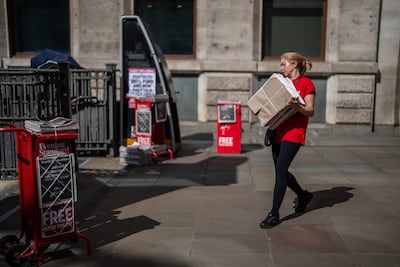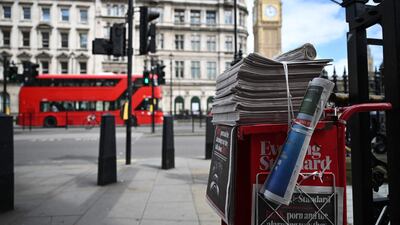Local newspapers worldwide are disappearing. At least 300 British local newspapers are estimated to have closed in the decade up to 2019. Other countries have seen similar closures. Even London – with a population touching nine million – has found that the Evening Standard can no longer survive commercially as a daily newspaper.
After almost 100 years, the Standard is going weekly. I used to buy it, along with many London commuters, for my evening Tube journey home. It became free in 2009, but it was often discarded or ignored, lacking the immediacy of news on mobile phones especially since WiFi is now available on the London Underground.
The Londoner joke was that the Standard might be free but it still wasn’t worth it. I confess I didn’t pick up the free-sheet often. The main owner, Lord Lebedev, spent a lot of money on the Standard and other media projects but that resulted in another Londoner joke: how do you make a small fortune? Start with a big fortune and try to make money from newspapers. Even so, its passing is a sad moment.

Like many journalists, I began my career on a local evening newspaper, the Belfast Telegraph. I moved to Northern Ireland during "the Troubles,” the years of inter-communal violence during which more than 3,000 people were murdered. The British army were routinely on the streets of Belfast.
During these grim times “the Tele”, as it was called, was highly regarded by readers. And necessary. There were so many sectarian murders – people killed because of their religion, Catholic or Protestant – and local newspaper reporters were sent to knock on the doors of bereaved relatives to listen to their grief.
What astonished me was the kindness of grieving families, most of whom desperately wanted to talk and who implored the killers to stop in the name of peace. At one point there were so many killings that a local TV news station editor told me he received a phone call from a bereaved family complaining that their loved one’s death had not been properly remembered because a reporter had not turned up at the funeral.
Local news, in other words, was hugely important to the people it served. It still is, even if Facebook, Twitter, WhatsApp and other sources of information – some of them accurate – have replaced local newspapers and radio stations. Sales figures for the Belfast Telegraph, The Scotsman in Edinburgh or The South Wales Echo in Cardiff, like that of London’s (free) Evening Standard have fallen steeply.
The BBC – strapped for cash and trying simultaneously to be a national, international and local broadcaster – has been forced to make cuts affecting local radio, merging programmes across 39 local stations and therefore being less local.
Being “digital first” is however inevitable. It means BBC programmes are available when and where listeners and viewers want them, rather than, as in years past, when the programme makers decided to transmit them.
And newspapers can still thrive in this digital world. You no longer have to be in Belfast to read the locally produced Belfast Telegraph or Irish News. They are available worldwide online. The National’s success extends beyond the UAE. It’s a worldwide presence. That means communities from South Asia to the Americas, Australia to Europe can keep in touch with the events and news in this crossroads of the world.
The New York Times latest circulation figures (May 2024) show that it has 10.5 million subscribers, of whom 9.9 million (including me) are online. There are just 640,000 print subscribers, yet the paper thrives.
When I lived in the US, I enjoyed the thud of The New York Times delivery in the mornings, and there is something very satisfying about a print newspaper with the morning coffee. But the advantages of immediacy and worldwide reach are so much greater. The question therefore is whether a news offering is worth the price of subscription.
In the case of London’s Evening Standard it would appear that most readers decided they can do without it. But the hunger for news and trusted facts about the world will never change.
Amid the deluge of new media and new information sources – some of which can be unreliable or in some case actively duplicitous propaganda – the question is whether audiences and readers can be persuaded that finding out the truth about our interconnected and increasingly complex world is worth paying for.
I would suggest that newspapers, local and national may have flaws and make occasional errors, but good information, facts and truth are obviously vital to understanding how the world works.
Back in 1921 that great British newspaper, The Manchester Guardian, celebrated its centenary. Its famous editor C P Scott noted then that “comment is free, but facts are sacred”. If Scott were alive today he might note that the curse of the modern information age is that we are deluged with comment which may be free but is often fact-free too.
And facts are sacred, but finding them is costly. That’s why we need newspapers, international, national and local.


